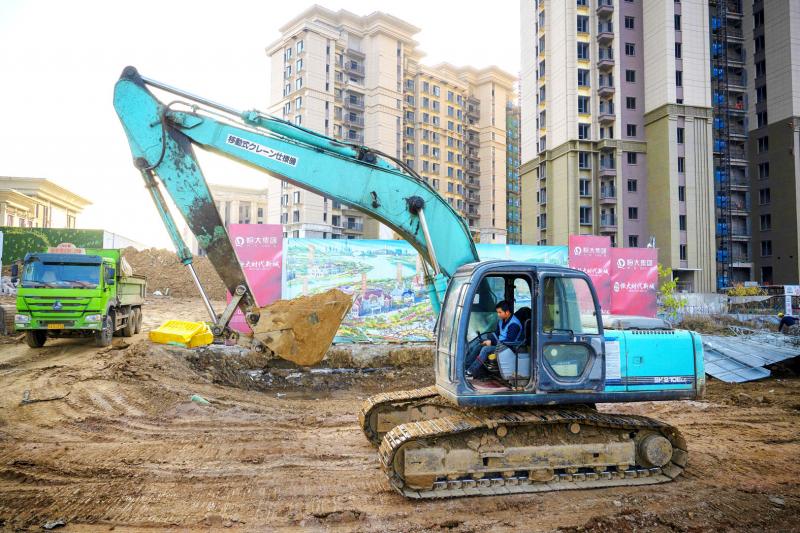China Evergrande Group (恆大集團) would deliver almost four times as many housing units to buyers this month as it had in the previous three months, chairman Xu Jiayin (許家印), or Hui Ka Yan in Cantonese, said, as the real-estate behemoth grapples with massive debts.
Evergrande — drowning in US$300 billion in liabilities — has struggled to repay bondholders and investors after becoming ensnared in Beijing’s deleveraging crackdown on the bloated property sector.
However, the group — which officially defaulted on a major bond payment this month — has said it would be able to complete tens of thousands of units and pay off some debts.

Photo: Bloomberg
“Since the company’s troubles began, we delivered fewer than 10,000 units in September, October and November,” Xu told a company meeting on Sunday evening, according to a post on Evergrande’s WeChat account.
“There are only five days left this month. We must charge full steam ahead to guarantee the delivery of 39,000 units this month,” he said.
The new homes are across 115 developments, he added.
“Absolutely nobody at Evergrande is allowed to ‘lie flat,’” Xu said, referring to an Internet slang term for “slacking off” popular among young people.
In the past few months, the company has repeatedly said it would finish its unfinished projects and deliver them to buyers in a desperate bid to salvage its debts, despite having missed a payment of more than US$1.2 billion earlier this month. Earlier struggles to pay suppliers and contractors due to the debt crisis led to sustained protests from homebuyers and investors at the group’s Shenzhen headquarters in September.
Since then, the bloated firm has tried to sell off its assets and shave down its stakes in other firms, with Xu paying off some of the debts using his own considerable personal wealth.
The provincial government of Guangdong — where the firm is headquartered — is overseeing Evergrande’s debt restructuring process, but Beijing has yet to roll back any of the restrictions that prompted the housing crunch.
Having already blamed the firm’s woes on “poor management and blind expansion,” China’s central bank on Saturday vowed to protect the rights of home buyers and promote the healthy development of the real-estate market.

Intel Corp chief executive officer Lip-Bu Tan (陳立武) is expected to meet with Taiwanese suppliers next month in conjunction with the opening of the Computex Taipei trade show, supply chain sources said on Monday. The visit, the first for Tan to Taiwan since assuming his new post last month, would be aimed at enhancing Intel’s ties with suppliers in Taiwan as he attempts to help turn around the struggling US chipmaker, the sources said. Tan is to hold a banquet to celebrate Intel’s 40-year presence in Taiwan before Computex opens on May 20 and invite dozens of Taiwanese suppliers to exchange views

Application-specific integrated circuit designer Faraday Technology Corp (智原) yesterday said that although revenue this quarter would decline 30 percent from last quarter, it retained its full-year forecast of revenue growth of 100 percent. The company attributed the quarterly drop to a slowdown in customers’ production of chips using Faraday’s advanced packaging technology. The company is still confident about its revenue growth this year, given its strong “design-win” — or the projects it won to help customers design their chips, Faraday president Steve Wang (王國雍) told an online earnings conference. “The design-win this year is better than we expected. We believe we will win

Chizuko Kimura has become the first female sushi chef in the world to win a Michelin star, fulfilling a promise she made to her dying husband to continue his legacy. The 54-year-old Japanese chef regained the Michelin star her late husband, Shunei Kimura, won three years ago for their Sushi Shunei restaurant in Paris. For Shunei Kimura, the star was a dream come true. However, the joy was short-lived. He died from cancer just three months later in June 2022. He was 65. The following year, the restaurant in the heart of Montmartre lost its star rating. Chizuko Kimura insisted that the new star is still down

While China’s leaders use their economic and political might to fight US President Donald Trump’s trade war “to the end,” its army of social media soldiers are embarking on a more humorous campaign online. Trump’s tariff blitz has seen Washington and Beijing impose eye-watering duties on imports from the other, fanning a standoff between the economic superpowers that has sparked global recession fears and sent markets into a tailspin. Trump says his policy is a response to years of being “ripped off” by other countries and aims to bring manufacturing to the US, forcing companies to employ US workers. However, China’s online warriors